#universe development: to be a phillips
Explore tagged Tumblr posts
Text
I think the Deans are fucking Lovecraftian gods
If you're a regular reader of my nonsense, you may have noticed that on more than one occasion I've referred to the Deans as "Nyarlathotep Tumblrsexymen": no, I didn't have a stroke on the keyboard, this is a reference to an entity that appears in the stories of Howard Phillip Lovecraft. A writer who is widely known because there were even people who thought that the Necronomicon, a fictional text part of his work, actually existed (and because he was such a recalcitrant racist that it has become a meme about how extremely racist he was).
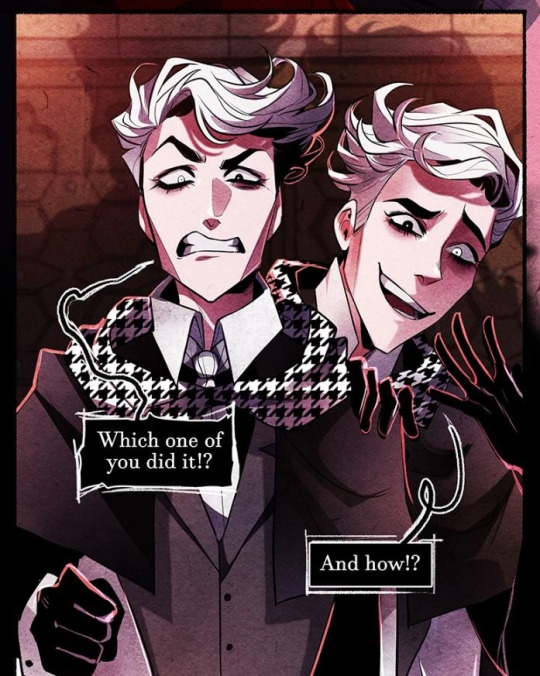
And since I'm still going through my pile of papers on Gothic fiction, let me take a moment to talk about Lovecraft's work, why I have reason to believe that the Deans have something in common with these creatures, and what that might mean for the development of Nevermore.
A Little About Lovecraft's Gods
To understand a little bit about the kind of creatures we are talking about, I have to stop at a brief (seriously brief) description of cosmic horror: This is a type of horror that takes elements from the scientific publications of the time (which makes it close to science fiction) to give it verisimilitude, it has at its core a deep nihilism, the breaking of scientific canons, the fragility of the human mind and societies contrasted with the vastness of the universe, an enormous fear of "the unknown" for the white man (fed by his racist paranoia), and seasoned with tentacles and creatures that remind us of sea creatures, because Lovecraft had an enormous fear of the sea.
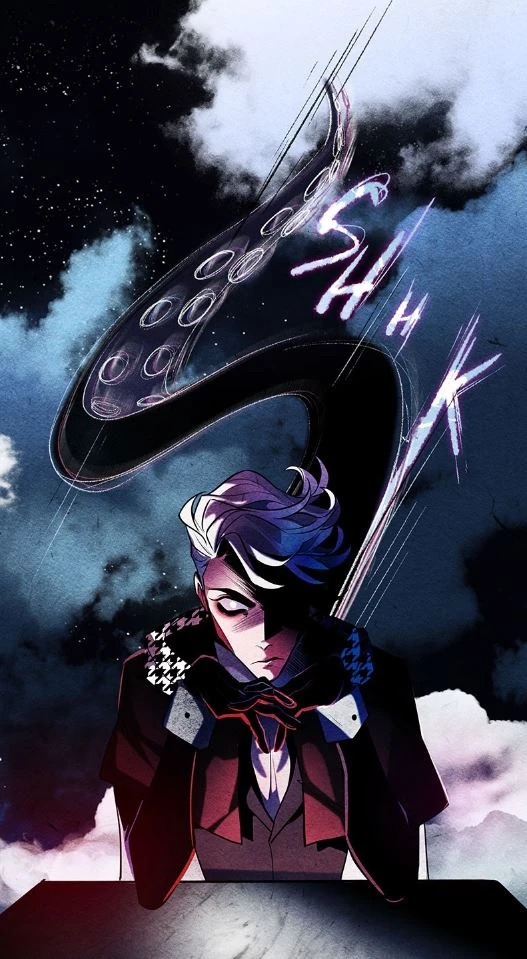
The gods in these stories represent, on a symbolic level, the vastness of the universe, the terror of the unknown, and the fragility of the human mind: they are entities older than time itself, contact with them tends to shatter the mind, and humanity must be very, very grateful that most of them are locked away or incapacitated in some way. Also, the way to access them is through very specific rituals that have been lost over time, so thankfully they're not very easy to contact either.
Similarities with the Deans
Let's start with the most obvious: the Deans, like the Lovecraftian gods, seem to operate in their own plane of existence, beyond what humans understand as "life" and "death": Nevermore is a kind of limbo, but we know, thanks to the Raven, that these guys came from another place and had enough power to kick the crap out of psychopomps without any problem.
However, just like Lovecraft's gods, these enormous powers don't make them able to do whatever they want; as I said, these entities are usually locked up or incapacitated in some way and can only have contact with humans under certain circumstances (like being summoned in rituals), and getting out of their prisons usually requires vague events like astral alignments that are completely out of their control.
The Deans, like Lovecraft's gods, seem to be subject to rules that are above them, and while they can bend them a bit to achieve their goals, it's not like they can do much about it.
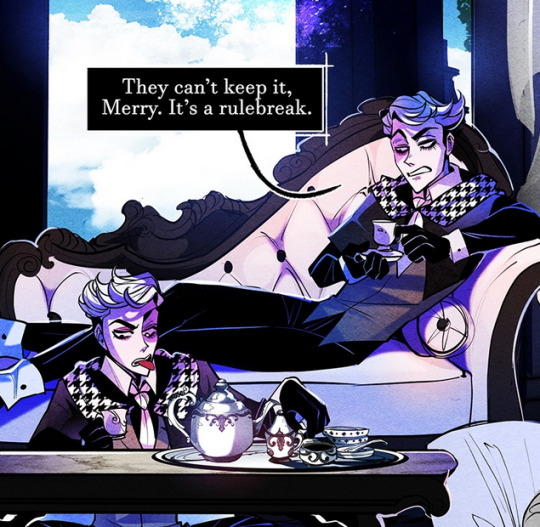
Another thing they have in common with Lovecraft's gods is the ability to create servants that function as extensions of them to fulfill their designs. There are many creatures that follow this line in the stories that speak of The Myths, but the best known are the Shoggoth that appear in the novel At the Mountains of Madness: artificial beings created by the Old Ones to rule the Earth, described as amphibious, amorphous masses similar to amoebas.
Although the Deans prefer their minions in the form of animated dolls. I suspect this decision is based on the story The Sandman by E.T.A. Hoffman. I have no proof, but no doubt.
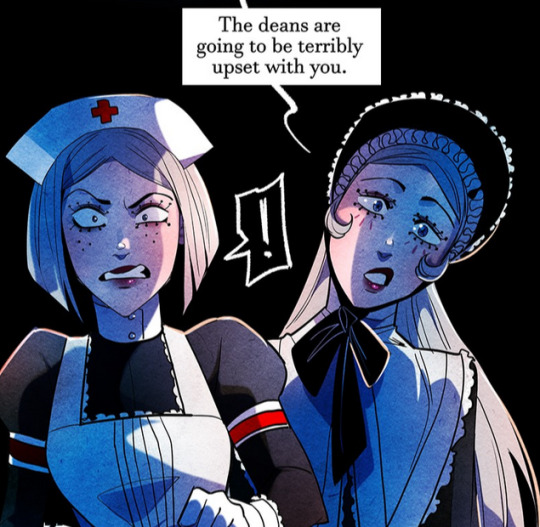
Now for the joke that brings this essay to life: the creature in Lovecraft's universe that most resembles the Deans is a being called Nyarlathotep. This creature belongs to the category of "Other Gods" (not the old ones like Cthulhu) and gets very nice nicknames like "Crawling Chaos".
Nyarlathotep is a being who enjoys causing chaos, death and madness wherever they go. They can communicate with humans, which they use to psychologically torture them and make them lose their minds. Something they seem to enjoy quite a bit. In the same way that the Deans view this sadistic battle royale, they have set up a fun game.
Then there is the ability to manipulate and alter the human mind, which is called into question in stories like Nyarlathotep and The Rats in the Walls (where it is apparently Nyarlathotep who messes with the protagonist's mind so that he tries to kill his friend).
This is something we've seen manifest in Nevermore in two different ways: the ability to trigger or unlock memories.
And the ability to change them. While we can't know if what was shown to Annabel is 100% real, we do know that showing her the end of her life caused a permanent change in the way she retrieves her memories: from the end backwards. If this memory is somehow altered, we also know that the Deans are capable of photoshopping people's memories.
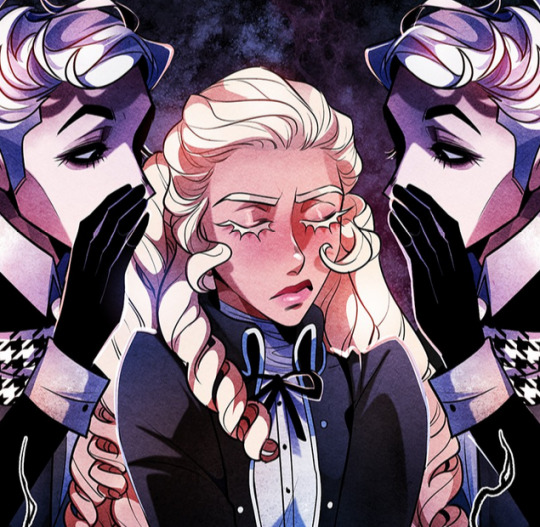
Finally, Nyarlathotep has the ability to shape-shift, which allows them to appear as humanoids in several stories, such as The Oniric Quest of the Unknown Kadath or Dreams in the Witch's House. His human form is considered "unnatural", "strange" and "disturbing" by those who see it (remember that Lovecraft was extremely racist, so he always presents himself as a black man). As a pharaoh in the Randolph Carter cycle and as a charcoal humanoid figure in the second story cited).
Here, the human form of whatever the Deans are is also quite atypical: not only are they ridiculously tall (7 feet), they have heterochromia with a white-colored eye (which I would venture to say may be a reference to the cataract eye mentioned in the story "The Tell-Tale Heart" by Edgar Allan Poe), and their synchronized movements are amusing on paper, but possibly strange to look at for the characters.
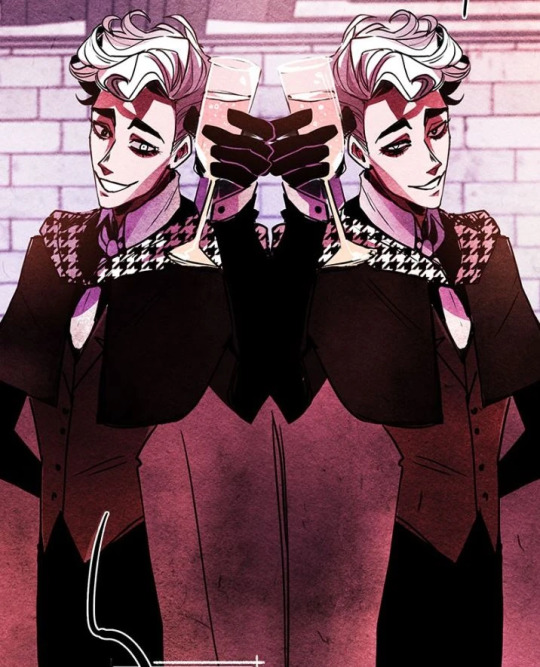
Otherwise, there are two other entities in Lovecraft's universe whose descriptions can be loosely associated with the Deans: Yogg-Sothoth and Azathoth. Both are beings of dual nature.
The former is an entity associated with omniscience and appears in stories such as The Strange Case of Charles Dexter Ward and The Dunwich Horror. and is described as "the key and the door".
Azathoth represents omnipotence, is the center of the universe, and is described as "the beginning and the end" or "the alpha and the omega.
Implications for the comic
The fact that the Deans have elements in common with Nyarlathotep brings up an interesting point: although Nyarlathotep has far greater freedom than other beings, they is a servant of Azathoth. In other words, them powers are subservient to a more powerful being whose plans they must follow. They may amuse themselves in the process, but they is still essentially a butler.
On the other hand, the Azathoth connection might be vague, since this creature is a lobotomized god, so he can't do much. But if the reference is to Yogg-Sothoth, it gets a little more interesting, because that entity is the one who is supposed to release the original gods when the time is right.
And I don't know about you, but these references have me wondering if the Deans are working for something much more messed up than they are, or if they're using the souls of the students to bring back something much more sinister.
#nevermore webtoon#lovecraft mythos#Lovecraft Reference#I don't trust these bastards at all#Seikca#if you are reading this#I want you to know that it is your fault lol
128 notes
·
View notes
Note
Hi can I ask for some audio drama recommendations? I'd like something with important ace and/or aro characters... Alternatively, I'm looking for any kind of good comedy :)
For aroace characters, my go-to recommendation is InCo. Nova, a grumpy information dealer, finds a naive alien boy floating in space who claims to be the prince of a fairytale planet. Hijinx ensue. Nova is aroace, and she develops a deep platonic relationship with prince Hatov which is best described as a slow burn friendship. Someone on this site once described the show as “a love story for people who hate romance” which I thought was very fitting. I love this show, the third season especially is great. Completed with 3 seasons.
My favorite comedy audiodrama is Mission Rejected. When the superspy is told “this is your mission, if you choose to accept it”, what happens if they say no? The backups are called in, of course! A pencil-pusher, an intern, a failed actor, and a hacker on work-release are stuck doing all the unglamorous missions declined by suave superspy Chet Phillips. Expect parodies of all the spy tropes and a lot of setup for stupid puns. In a great coincidence, the main character of this show is implied to be aroace. It’s never directly stated, but he never shows attraction to anyone and becomes close platonic friends with a female member of the team. Ongoing, current has 5 seasons.
By the same creator as InCo, Stories From Ylelmore has similar aroace vibes. It’s a cozy urban fantasy show that follows 3 kids, a witch a werewolf, and cursed, who get up to shenanigans in their magical small town. This show has similar vibes to the cartoon Hilda. It’s not really a comedy, but it definitely has jokes (it has made me laugh out loud multiple times). Ongoing, currently has 2 seasons with a third final one on the way.
Hamuel Burger and the American Dream is a absolutely wild surrealist comedy about an alien twitch streamer who has come to Earth to speedrun killing/becoming the President. It's laugh-out-loud funny, with lots of references to internet culture. I don’t think it has any ace characters. Ongoing, currently has 7 episodes.
Another show with a sort-of aroace lead is Lost Terminal. It’s a hopepunk post-apocalyptic sci-fi podcast about a lonely AI looking for friends. In a world rebuilding from a climate disaster, Seth, a sentient AI that lives in a space station, narrates his reports sent back to a long-gone mission control. This show is hard sci-fi, which is rare among audiodramas. It’s another show where the main character is never stated to be aroace, but never has a romance plot and feels aro. Ongoing, with currently 16 seasons.
Less is Mourge is also a comedy with an ace character. In an alternate-universe Florida where the supernatural is mundane, a ghost and the ghoul who ate her corpse start a chat podcast. There’s a lot of jokes referencing modern internet culture, and the ghoul is asexual. Sadly this show is on an indefinite hiatus midway through its second season.
#audiodrama#asks#inco#mission rejected#stories from ylelmore#hamuel burger and the american dream#lost terminal#less is mourge
24 notes
·
View notes
Text
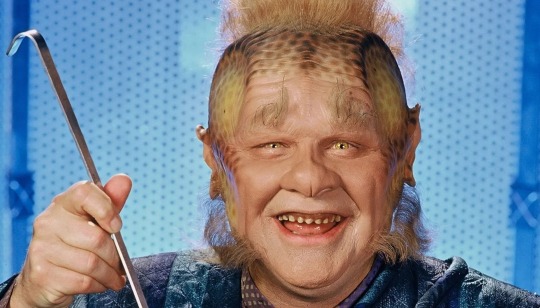

Insufferable Comic Relief Round 1
Propaganda why Neelix is an insufferable Comic Relief:
"I hate him. His narratives are probably not even that bad he just annoys me so much I can't watch scenes with him in them"
"I read this mfer only had one submission; I assumed he was already 1000x submitted but I guess if you want something done right you gotta do it yourself. He's supposed to have scavenged around for ages, but all he does is play stupid, be a jealous asshole, eat hot bacteria cheese, and lie. He's got the intellectual capacity of a toddler, the maturity of a sixteen year old incel, and the discipline of an orange cat. And frankly it's a WASTE of Ethan Phillips' talent, too. He's got a couple good episodes where he gets to have depth, but noooo, for the rest of the show, he's just annoyingly goofy. "I'm the senior Talaxian on board" you are the senior CLOWN on board. Sit the fuck down Pagliacci. "Neelix is dumb and lied his way into the job and can't tell left from right" is fun once, maybe twice, but seven seasons of it? Yeet that mfer out the airlock I beg you. They tried sooo hard to make a Spock/Data/Odo type character who doesn't get humans and mix some Quark fun hijinks into it but all they got was a fucked up Wesley Crusher. Get him off this show ASAP. The website I got the picture from says "Why Neelix Leaving The USS Voyager Is A Perfect Star Trek Ending" BECAUSE HE FINALLY LEFT THAT'S WHY.
AU where Neelix actually got to have character development, Neelix (Star Trek) Redemption, Slow Build, Alternate Universe: what if VOY didn't waste one of its best actors, PLEASE"
"Seconding Neelix Voyager because UGH is he fucking annoying. He's inconvenient and he wants to "help" people all the time but doesn't care if they want to be helped which leads to SO MANY awkward scenes. Completely ignores his coworker Tuvok's comfort and culture and just DECIDES he's going to help Tuvok be more chill even though Tuvok never implied he wanted that and actually prides himself in following Vulcan culture. Besides he's annoyingly jealous of his girlfriend Kes in earlier seasons, leading to him fighting with one of her few friends for... being nice to her? Spending time with her? I hate that fucker honestly, sorry to any Neelix fans, he only grows on me when Naomi gets introduced"
Propaganda why Lobbo is an insufferable Comic Relief:
"Everything about him makes me wanna kick like the ball he is shaped like
I can't even begin to explain why I hate him, it's one of those things where you have to see him and hear him to understand
He doesn't need to be there, and he will never need to be there
His only reason to exist is to cause my suffering, I'm sure of it at this point "
"He is annoying and rude as the joke, as well as constantly saying his own name as if it’s supposed to be funny."
"I don't know how easily I can condense my hatred towards this ball-shaped thing into words, but I will try my best. He is the most immensely frustrating and annoying character within the confines of this show. Every time he unfortunately floats onto the screen, I want to lob him across the Merged Lands. His entire personality and speech patterns are irksome. I genuinely, truly, from the bottom of my Undertale heart soul, wish that he was never included in the show."
#neelix#star trek voyager#lobbo#ninjago dragons rising#insufferable comic relief poll#insufferable comic relief#tournament poll
19 notes
·
View notes
Text

Cooking Flawless Pasta
Scientists have pinpointed energy-efficient ways to cook al dente pasta and developed an infallible recipe for the perfect cacio e pepe sauce. [...] A bowl of steaming hot pasta covered in your favorite sauce and dusted with a healthy dose of parmesan cheese comes high on the list of ultimate comfort foods. But cooking that pasta to perfection can be more difficult than seemingly simple recipes imply. Now two separate teams of researchers have explored two different aspects of executing a flawless dish. In one study, Phillip Toultchinski and Thomas Vilgis of the Max Planck Institute for Polymer Research, Germany, studied whether perfectly al dente spaghetti could be prepared in a more energy-efficient way [1]. In a second study, Matteo Ciarchi and Daniel Busiello of the Max Planck Institute for the Physics of Complex Systems, Germany, Giacomo Bartolucci of the University of Barcelona, Spain, and colleagues developed a recipe for making perfect cacio e pepe, a three-ingredient cheese sauce that is surprisingly easy to mess up [2]. “It is very difficult to make this sauce,” says Busiello. “You are almost always doomed to fail.”
Read more.
#Materials Science#Science#Food#Food science#Energy#Efficiency#Proteins#Biomaterials#Cross linking#Starch
26 notes
·
View notes
Note
I've seen your posts about Russell Adler and they are wonderful to read! My favorite one is the morality of Russell Adler ,I thought it was so insightful to his character and really well done.👏
I'm curious what do you think about the headcanon, which Russell Adler is the father of Phillip Graves ? I've seen it around the fandom and I like reading what others think of it.
Thanks so much for your time !
Aw, thank you so much for the kind message! I'm glad you enjoyed that post, I'm actually working on an updated version of that to reflect what we see in Black Ops 6 and how his character has developed over time.
As for the whole concept of Adler and Graves being related -- I actually really do not like it. If that's your headcanon, I respect that, I even see the appeal in it, but personally, I just do not like it. Here's why;
(TLDR; I do not like the headcanon, it makes zero sense for Adler to raise a child like that and the two characters are not even in the same universe. )
On Phillip Graves' Lineage
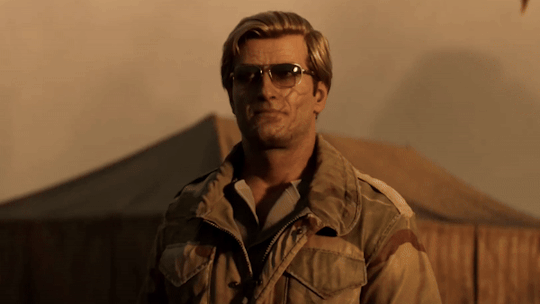
First you may be asking - why don't I like it?
Simple, it really is not in character for Adler to raise a brat like that or fuck up fatherhood so royally that he raises a leader of a mercenary group whose loyalty goes only to the highest bidder. I love all of my Graves' fans but honestly, he's a POS in my opinion. (Doesn't stop him from being hot tho)
Graves has no motivation to betray the 141, y'know, the guys who are actively trying to stop and protect civilians from a deadly missile attack, aside from a fat pay check from the douchebag himself, General Shepherd. Still yet, he betrays them and then later denied involvement and threw Shepherd under the bus when it benefited him.
Okay - so what does that have to do with Adler?
A lot actually. This headcanon actually came into popular fandom canon for two reasons, A) they look alike. B) people like to draw false parallels between the two characters.
The second part is what frustrates me. That mostly comes from people completely misunderstanding Adler's character and taking his actions, dialogue, and narrative and twisting it into something he absolutely is not.
Essentially the line of thinking is "Well Adler is an asshole, Graves is an asshole, so the two must be related." There are several things wrong with this statement. Firstly, Adler is actually a very loyal and devoted man who employs seemingly harsh and unorthodox methods to his job. Saying Adler is just an asshole because he brainwashed Bell and is therefore unlikable is such a surface level take and it irks me to no end.
I think there is a cutscene in BO6 where Adler is listed as having kids and I can see that, I mean the man does theoretically have an ex-wife (unless he was lying just for funsies) so it's not out of the question for him to have them. While I don't think Adler is the Father of the Year in any sense of the title, I do not think he is uninvolved. Perhaps very distant and pretty big on tough love and not always there due to the nature of his work, but he still loves them and I would think his kids know that he loves them in his own way. (Definitely gave them so weird ass daddy issues along the way though)
So yeah, no, I don't think Adler gave Graves daddy issues so bad that he became the absolute garbage fire of a man he is today. It's not like him and it takes a lot worse than daddy issues to give a man motivation to do something like that.
Also, the main reason they are not related:
Black Ops and Modern Warfare are not even in the same universe. Yes, I know they are both in the franchise but no, they are not in the same universe. And if the devs ever decide to retcon that decision I will turn into Travis the Chimp and bite some poor lady's face off in a psychotic rampage.
It would make no sense if the events of either franchise occurred in the same universe.
When I am referring to Black Ops, the only games that are canon/have any relevance are of course World At War (mostly because of Reznov), Black Ops, Black Ops 2, Black Ops Cold War and Black Ops 6.
When discussing Modern Warfare (the reboot, not the originals), the only games that are canon are Modern Warfare 1-3 (three is questionable, I feel like that game is the one thing devs need to retcon and rerelease with a different story)
It is literally impossible for Adler to be the father of Graves, the two don't even exist in the same universe.
At the end of the day,
I did not write this to be mean or to shit on anyone's headcanon. I mentioned it before, I do see the appeal in it, if you happen to have a different opinion on the two characters than I do. If you like this headcanon, go on with ya bad self and keep posting your art and fanfiction about it. My opinion on it doesn't/shouldn't affect yours at all. <3
#thanks for the ask!!#russell adler#phillip graves#black ops 6#black ops cold war#modern warfare 2#mw2#bo6#bocw#call of duty#cod
40 notes
·
View notes
Text
COD (Call of Duty) Roleplay (F4M)
18+
Hello there! I’m currently on the lookout for a long-term, detailed roleplay partner who’s as passionate about storytelling as I am!
I’m a 19-year-old female roleplayer who loves diving into rich, immersive plots and creating meaningful character connections. My focus is on playing my original character (OC), but I’m more than happy for you to bring your own OC to the story if that’s your preference. If you enjoy writing canon characters, I’d love to write with anyone from the Call of Duty universe—some of my favorites include:
• Frank Woods
• John Price
• Johnny MacTavish (Soap)
• Simon Riley (Ghost)
• Kyle Garrick (Gaz)
• Alejandro Vargas
• Rodolfo Parra
• Phillip Graves
• David Walker
• Logan Walker
• Keegan Russ
• Nikolai Belinski
• Alex Keller
But don’t feel limited to the Call of Duty universe—I’m open to exploring other fandoms or creating crossover scenarios. For example, I’d love to dive into the world of The Last of Us, particularly with Joel Miller, but I’m flexible if you have other characters or ideas in mind. I’m also partial to the SCP or Creepypasta Fandoms.
The setting doesn’t have to be strictly canon-based either! I’m open to creating entirely new worlds, whether it’s a gritty post-apocalyptic setting like TLOU, a medieval dragon-riding fantasy, or even a dystopian future. The characters can adapt to any setting you prefer, and I’d be thrilled to work on something uniquely tailored to both of our interests.
Some potential ideas:
• Dragon AU: Imagine guilds specializing in taming mythical beasts, with characters like Ghost or Soap as hardened dragon tamers.
• Future/Dystopian AU: A crumbling society where survivors fight for resources, loyalties are tested, and bonds are forged.
• Crossover Setting: Combine characters from different fandoms, such as Joel Miller teaming up with Captain Price in a survival-focused narrative.
• Modern Conflict: A grounded military or espionage story with intrigue, danger, and intense character development.
I’m open to other fandoms too, so feel free to suggest something you’re passionate about!
NSFW is not a must but can be included. The focus WILL be on the story/plot and not on sexual themes or explicitly romance, but romance will be a large part.
I usually prefer roleplaying on Discord because it helps keep everything organized and allows for quick communication. If you’re interested, feel free to add me at kenna4769—I’d love to connect and start crafting an exciting story together!
Looking forward to hearing from you!
- Kenna
Details: Freeform, paragraphs required, long-term RP partner preferred. Will be played one-on-one. This RP is only open to adults. This RP may contain optional sexual themes. Participants should discuss their comfort and interest levels. If participants choose to include them, "fade-to-black" may still be used.

#discord#discord rp#roleplay#oc rp#mature rp#call of duty#cod#call of duty modern warfare#gaz#johnny mactavish#soap#ghost#headcanon#john price#cod nikolai x reader#nikolai belinski#kyle gaz garrick#kyle gaz x reader#john soap mactavish#johnny soap mactavish#DnD#dndroleplay#TLOU#the last of us#creepypasta x reader#creepypasta#joel miller#scp foundation#scp fandom#scp doctors
23 notes
·
View notes
Text
Clair de Lune Cleaners (14566 words) by PawPunk Chapters: 1/1 Fandom: Legends of Avantris (Web Series) Rating: Mature Warnings: Creator Chose Not To Use Archive Warnings Relationships: Farryn & Briggsy Kratch & Lethica Nightborne & Marius Renathyr & Jericho Sticks & Yorgrim Characters: Briggsy "The Kutlass" Kratch, Marius Renathyr, Jericho Sticks, Lethica Nightborne, Farryn of the Hartsblight, Yorgrim (Legends of Avantris), Phillip Druskenvald Additional Tags: Campaign: Edge of Midnight (Legends of Avantris), Alternate Universe - Modern Setting, Alternate Universe - Human, Dark Comedy, Developing Friendships, Poverty, Animal Death, Child Death, Jericho Sticks is Autistic When Briggsy takes a job for a sketchy-looking cleaning company, he expects to do some hard work, earn an insultingly small paycheck, and slowly save up enough money to move out of his dad's basement. Instead, he finds himself wrapped up with five of the people he'd be least likely to be friends with in the world---and caught up in a system much more powerful than himself.
EoM modern/human AU.
My modern AU is finally done! @be-jargogled I believe you'll be wanting to see this?
Keep in mind that this fic is a dark comedy, so heed the warnings.
#edge of midnight#eom#loa eom#legends of avantris edge of midnight#briggsy kratch#jericho sticks#marius renathyr#lethica nightborne#farryn of the hartsblight#yorgrim#phillip druskenvald#pawpunk
10 notes
·
View notes
Text

The Road Trip
By: GleefullyPolin
Chapter 7 Update:
Colin struggles with writers block and Penelope has a suggestion that might help him get over it. Meanwhile, Eloise has a shocking development she shares with Pen about her and Phil.
Summary:
Colin Bridgerton and Phillip Crane were about to embark on an epic cross-country road trip across America in a 1967 Camaro. They had been planning it since they met each other their first year at University and now nothing was going to stand in their way.
Except for maybe a little sisterly blackmail, some mild complaining, and two best friend's who end up along for the ride.
This is a coming of age tale about plants, self-exploration, secrets, love, and a story that binds four people together for life.
Notes:
Nashville I did not know you well, I only saw you on my way to Graceland. So thus, you got what you got in this chapter. Next up we move to Savannah, where Phil and Penelope have a well needed discussion about the growing relationships on the trip, and karaoke night leads to quite an interesting evening for one couple.
#polin#polin fanfiction#stacy's fics#colin bridgerton#penelope bridgerton#penelope featherington#colin x penelope#penelope x colin#bridgerton#peneloise#eloise bridgerton#phillip crane#philoise
16 notes
·
View notes
Photo

William Tyndale
William Tyndale (l.c. 1494-1536) was a talented English linguist, scholar and priest who was the first to translate the Bible into English. Tyndale objected to the Catholic Church’s control of scripture in Latin and the prohibition against an English translation. His work formed the basis of all other English translations of the Bible up through the modern era.
The Latin Vulgate Bible, translated from the original by Saint Jerome (l. 347-420), assisted by Saint Paula (l. 347-404) was considered the only true version by the Church, and translation into the vernacular, in any country, was forbidden. Even before the Reformation began in 1517, however, European scholars had already translated the Bible into their own languages, the German translation by Martin Luther (l. 1483-1546) being only one among many. The proto-reformer John Wycliffe (l. 1330-1384) had translated the Bible from the Vulgate to Middle English in c. 1380 but volumes of this work had been burned after his death.
Tyndale requested permission from ecclesiastical authorities to translate the Bible from the original Hebrew and Greek but was denied. He then left for Germany where he translated and published his work on the New Testament and part of the Old Testament, along with other writings, and had them smuggled into England. Tyndale is recognized as the first to translate the Bible into English, rather than Wycliffe, because he worked from the original languages, not just the Latin translation, as Wycliffe had done.
Tyndale moved about to maintain safety after Henry VIII (r. 1509-1547) called for his arrest and was well-protected by wealthy merchants in Antwerp when he was betrayed by Henry Phillips, a man he thought was his friend, and imprisoned. He was executed by strangulation and his body burned at the stake in October 1536. Three years later, the English version of the Bible completed by his colleague Myles Coverdale (l. 1488-1569) was published in England with the king’s approval. Tyndale and Coverdale are both honored in the present day as the first to translate the Bible into English even though it is acknowledged that Coverdale largely developed Tyndale’s earlier work.
Early Life & Education
Little is known of Tyndale’s early life. He is said to have been born in the village of Stinchcombe, Gloucestershire sometime between 1491-1494 with most scholars favoring the later date. The family was of the upper class, descended from the Tyndales of Northumberland, and his brother, Edward, is recorded as holding a prominent position The family went by the name of Hychyns as well as Tyndale and William Tyndale used both alternately when young. He was educated from an early age, though the details are unknown, and was enrolled at Oxford University in 1506, receiving his Bachelor of Arts degree in 1512 and his master’s degree in 1515.
In 1512 he had also been ordained a priest and served as a subdeacon in religious services. By 1517, he was enrolled at Cambridge University and displayed a talent for learning languages, becoming fluent in French, German, Greek, Hebrew, Italian, Latin, and Spanish. Although associated with the Catholic Church as subdeacon between c. 1512-1521, he seems to have left that position to become a tutor for the children of Sir John Walsh of Gloucestershire c. 1521.
By this time, the religious and social movement that came to be known as the Protestant Reformation was underway in Germany, led by Martin Luther, and in Switzerland through the efforts of Huldrych Zwingli (l. 1484-1531). England, however, remained a Catholic country under Henry VIII who received the honorary title of 'Defender of the Faith' from the Pope for his written work condemning Luther and his teachings. In the same year that Tyndale took the position at the Walsh household, Thomas Wolsey, Cardinal Archbishop of York (l.c. 1473-1530), presided over a public burning of Luther’s works in London at St. Paul’s Cross.
Continue reading...
24 notes
·
View notes
Text



Greece Reopens the 2,400-Year-Old Palace Where Alexander the Great Was Crowned
The 2,300-year-old Palace of Aigai—the largest building in classical Greece—had been under renovation for 16 years.
On the day he was crowned king of Macedonia, Alexander the Great stood atop the intricately patterned marble floors of the Palace of Aigai. This week, the historic palace finally opened to the public after a 16-year-long restoration, report Derek Gatopoulos and Costas Kantouris of the Associated Press (AP).
At 160,000 square feet, the Palace of Aigai was classical Greece’s largest structure. Built primarily by Alexander’s father, Phillip II, in the fourth century B.C.E., it was the home of the Argead dynasty, ancient Macedonia’s ruling family. It was destroyed by the Romans in 148 B.C.E. and endured a subsequent series of lootings. Renovating and excavating this sprawling monument was a serious undertaking, costing over 20 million euros ($22 million).
The Greek government was able to maintain the “general appearance” of the site amid careful alterations to the monument’s towering marble columns, delicate mosaics and textured flooring, according to Xiaofei Xu and Chris Liakos. The palace once featured large column-lined courtyards, worship sites and expansive banquet halls, and its restoration presented a “three-dimensional jigsaw puzzle,” per the AP. Archaeologists solved it by combining stones from the structure’s ruins with replica parts to reproduce the original structures.


Archaeologist Angeliki Kottaridi started working on the renovation efforts as a university student. Overseeing the project’s progress over many years and contributing to its excavation and reconstruction, Kottardi became a leading figure in the project.
“What you discover is stones scattered in the dirt, and pieces of mosaics here and there,” Kottaridi told state television before an opening ceremony on Friday, per the AP. “Then you have to assemble things, and that’s the real joy of the researcher.”
The Palace of Aigai is located in northern Greece between what are now the towns of Palatitsia and Vergina. Its reopening builds on discoveries made in the late 1970s by Greek archaeologist Manolis Andronikos, who unearthed a cluster of royal Macedonian artifacts, including gold and silver ceremonial weapons and armor, and burials, one of which is thought to contain Phillip’s remains. The palace and its neighboring tombs are now a UNESCO World Heritage site.
Deeming it “among the most important archaeological sites in Europe,” UNESCO writes that the Palace of Aigai “represents an exceptional testimony to a significant development in European civilization, at the transition from the classical city state to the imperial structure of the Hellenistic and Roman periods.”



As the site of the first capital of the ancient kingdom of Macedonia, the Palace of Aigai signifies the onset of Alexander’s rule, which would stretch from Asia to the Middle East, and provides a crucial window into Macedonian culture.
“The importance of such monuments transcends local boundaries, becoming property of all humanity,” said Kyriakos Mitsotakis, Greece’s prime minister, at the inauguration event, per CNN. “And we as the custodians of this precious cultural heritage, we must protect it, highlight it, promote it and at the same time expand the horizons revealed by each new facet.”
By Catherine Duncan.
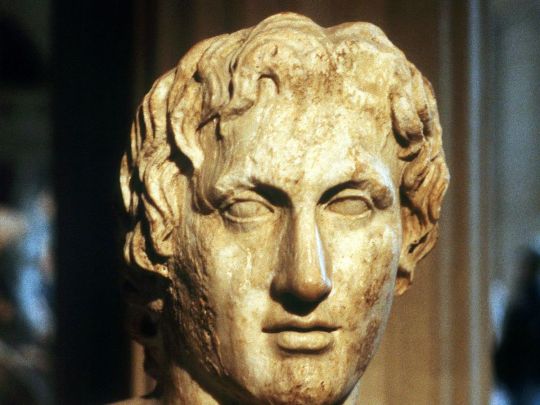
#Greece Reopens the 2400-Year-Old Palace Where Alexander the Great Was Crowned#Palace of Aigai#Argead dynasty#Phillip II#ancient artifacts#archeology#archeolgst#history#history news#ancient history#ancient culture#ancient civilizations#ancient macedonia#ancient greece#greek history#greek art
93 notes
·
View notes
Note
Was rereading the 7 deadly sins au and my mind went, you know what would be funny? Throw in some office rivalry.
Imagine Heaven and Hell being two different offices of one big company, The Universe. The Bridgertons who represent the deadly sins and the spouses who represent the heavenly virtues are rivals competing over who gets the end of the year/quarterly bonus. Score is kept by how many humans they have committing sins/virtues.
As someone who works in the office admin industry and knows the kind of hell it can be. Why would you wish that on my poor precious characters who have done nothing wrong to deserve being stuck in an office competing for who gets the better performance review and bonus. You are evil and I love it.
Actually you know what since I already did an Angels and Demons au today, why don't we make this one a North Pole company au. (You know I really liked Red One. )
I like to think that all of them work in the same building just different companies. Nicelist and Naughtylist, every year the managers crack the whip to get up those numbers and the numbers are actually humans corrupted or reformed during the year. At the end of the year, whichever company did better in the gifts vs coal business, gets a paid vacation and a bonus.
We got Project manager team leads who are Kate and Anthony, obsessing over one upping the competition by whatever means possible even if it means sabotage and playing every dirty trick in the book.
Market Researchers Penelope and Colin reporting on the situation from different parts of the world to see where they need to send more manpower.
In Marketing you have Sophie and Benedict competing against each other over who can make the nice list and the naughty list look more appealing to the fans .
In Finance you have Gareth and Hyacinth, with Gareth externally complaining that Nicelist doesn't have the money! and Hyacinth cooking the books of her company because there's always money. Gareth low key suffers knowing that whatever his competition is doing in Finance Hyacinth would NOT pass an audit
Phillip and Eloise are some form of executive upper management that are frequently stuck in meetings discussing why they need more time, and fighting over unreasonable toy and coal deadlines. They both have some form of truce, in the sense that they both hate their jobs and want to quit, but they do this for the spirit of Christmas. Which for Phillip means that nice numbers need to go up and for Eloise means that naughty numbers need to go up
I think Francesca and Michael are both undercover field agents in whichever city os having the most naughty/nice tie ins of the year. Their job is to manually boost the numbers by spreading the spirit of Christmas nice / naughty all over town. If Francesca is a mall Christmas Elf signing people up to do charity work, Michael will show up at the same mall as some sexy Santa Klaus advertising the opening of a strip club. If Francesca is hosting a Christmas community fair, Michael will host a Holliday party with free booze. You get the gist. And this year their tied 50/50
Simon and Daphne are the corporate spionage side of Research and Development. As such they are pretending to date each other to extract information about the competition. Daphne is insisting that she's being nice to Simon because she wants to and Simon is insisting that he's being naughty because he wants to... Jury is out on what those two are reporting to their bosses
Finally Lucy and Gregory are in HR, Lucy as a decent HR agent, obviously wants to jump off a window with how many HR and OSHA violations get committed by her company every year and she lives stressed out of her mind by employee complaints and is the most valued member of the team. Gregory as the less decent HR agent of naughtylist, has a very cushy job pretending that he doesn't see or know about all the HR and OSHA violations HIS company is deeply into commiting. His job is just to make sure nobody sues. Guess which one of them is up for a promotion?
Problems arise when the numbers on the nice list and the naughty list begin to look... Modified, hacked somehow. And it's a race against time to figure out, which company managed to hack the North Pole mainframe and which company is getting framed.
So what do you think? How about this Christmas au for you bestie

17 notes
·
View notes
Text
Meet Sophie Beckett, Bridgerton’s most elusive leading lady
It also hasn't escaped fans’ notice that, by the end of Season 3, all of the endgame love interests for the adult Bridgerton siblings – Daphne (Simon Basset), Anthony (Kate Sharma), Colin (Penelope Featherington), Eloise (Phillip Crane), and Francesca (Michaela Stirling) – have officially been cast and made an appearance on the show in some capacity…except for Benedict.
thanks to a number of factors, Sophie has become the single most elusive character in the entire show.
The secrecy surrounding Sophie became so blatant that a running joke developed amongst Benophie fans during the press tour for Season 3. Sophie was deemed the “Voldemort” of Bridgerton…given that Sophie was apparently also “[she] who must not be named”
So yes, while it was certainly exciting to read "Lady in Silver" in an official Shondaland article, it was simply not sufficient in light of the show's longstanding history of denying Sophie her rightful place in this universe.
Bridgerton has continued its habit of inexplicably keeping Sophie hidden from the world.
There is perhaps a greater discussion to be had about this long-term pattern of omitting Sophie (and now also Ha, who will be Bridgerton's third POC in a leading role, and the second WOC) from conversations surrounding this show
#I’m just gonna leave this here…#literally what is their deal with Sophie#let my girl just exist#the treatment of Sophie/Yerin will solidify how the show treat their POC leads#THERE IS A COMMON DENOMINATOR IN ALL OF THIS AND IF YOU CANT EVEN SPECULATE ON THE REASON WHY CHECK YOURSELF#if it sounds like a duck and looks like a duck it’s a duck#bridgerton#benedict bridgerton#sophie beckett#benophie#yerin ha#bridgerton season 4
38 notes
·
View notes
Text
youtube
IT’S FINALLY HERE! THE SIGMA ACAPELLA PROSHOT HAS ARRIVED!
When a non-descript University’s development plans involve the destruction of all “degenerate" and "unnecessary” clubs and societies, one Frat-star and his house of "Himbos" must team up with a "Theater Dad" and his underdog squad of the theatre department in order to save their home.
And maybe experience a little romance and kisses and whatever too. >>






Written and Produced by Annahis Basmadjian
Co-produced, Musical Direction, Associate Composition, Music and Lyrics, and Mix by Samuel Gillmore
Directed by Kate Ely
Choreographed by Selene Dublanko
Stage Managed by Emily Hoff
Associate Musical Direction by Florence Reiher
Composed by Sebastian Ochoa Mendoza
Filmography and Editing by Robert Hunt
Art by Oliver Love (@doorstoplord)
Featuring the talents of:
Nathan Mannion (Ray Rhiner)
Blake Sartin (Oliver Keaton)
Hailey Fowler (Veronica Mathers)
Katrina Teitz (Xena Zacharian)
Justin Low (Tyler)
James Penco (Chad/Brad)
Jared White (Josh)
Juliana de Medeiros (Hazel)
Sam Fraser (Westley Azuish)
Ken Tynan (Dean Guy)
Julia Halabourda (Barbara)
Garth Phillips (Adam)
Stacy Albrecht (Stacy Dawson)
Nicole Eves (Sierra Dawson)
Heller (Mayor John)
ENSEMBLE:
Kiefer Seeley, Kseniya Yemelyanova, Holly Krauchi, Viviana Renteria, Zoe Soupidis, Berfin Yildiz, Yasamin Isfahani
32 notes
·
View notes
Text
True Love Conquers All (Lilypad Essay cont.)
Ever since I realized the fairytale parallel was one of the main reasons I ship Lilypad, I've wanted to draw this, so here it is! Sig and Moon as Prince Phillip and Princess Aurora!
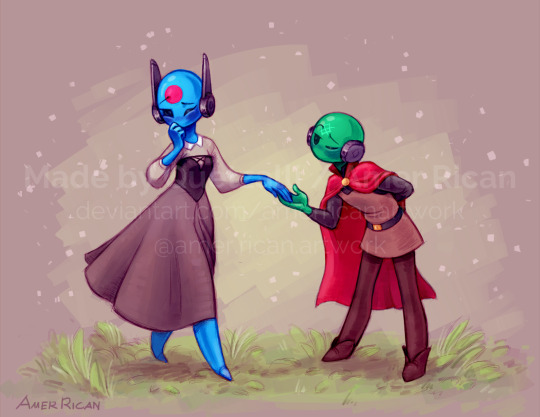
Actually, though, besides the drawing I'm also making this because I wanted to expand on that point from my Lilypad essay; there's still more I wanna gush about regarding the fairytale parallel!
I was too nervous to say it before, because it's derived largely from my personal tastes. However, I really wanna just write about my opinions on it now. Much of it's actually the feelings I've had about several ships before in various other fandoms, yet I've never really had the courage to express these feelings openly because I have yet to find even one person in any of these fandoms who feels the same way. However, I started thinking about it again, and I think it's about time I get it out somehow, at the very least to express these feelings in some tangible way so they don't stay bottled up forever. And maybe, just maybe, to find someone who likes these themes as much as I do!
Again, it's definitely very personal, so I don't mind if you completely disagree with all of it. But with that being said, if you want to read an additional 1,846 words on Lilypad fantasies, it's just below the cut!
To elaborate on why I love ships with fairytale parallels so much, it has to do with the poetic feeling stories like Sleeping Beauty seem to carry. I must preface that I don’t know the original fairytale, I’m pretty much entirely going off the 1959 animated Disney film, but even so I still love various themes within it and how they can be applied to other stories. Sleeping Beauty isn’t the only old Disney movie where I interpret these themes, or even the only animated story in general where these themes can be interpreted, but I think it’s overall the most similar to Lilypad specifically because of the whole “fair maiden dies and gets revived by the prince’s love” dynamic.
Something I’ve come to realize, especially upon developing a love for Rain World specifically, is that I adore stories about accepting one’s own nature and learning how to have it coexist with your personal goals rather than conflict with it. Sleeping Beauty has this not only through the eternal bond between Aurora and Phillip (I mean, “Once Upon a Dream” literally seems to be about how the singer will always love the person they fell for even if their love seemed too good to be true), but in the whole curse put on Aurora and the “true love conquers all” message. The conflict is all about how to ensure Aurora’s safety despite the impending doom of Maleficent’s curse on her, which is made more intense by how the curse can’t really be stopped, only lessened in severity. However, the inevitability of true love’s triumph over all obstacles, and really the inevitability of nature as a whole, is just so beautiful to me because it’s something so universal. As much as we may try to hide it, we humans are still animals, and still a part of nature as much as any other animal is, so the idea that forces as powerful and omnipresent as natural phenomenon could just as easily be on your side and working to help you reach your goals instead of trying to hurt you and keep you from them is very comforting specifically because of how powerful and inevitable these forces are. I mean, if forces like those can pose a seemingly impossible challenge when they seem to oppose your goals, what if they could also supply seemingly invincible support if you learned to work with them? Hence, why true love conquers all. It’s basically, “I can’t stop this thing, but maybe I don’t actually need to”. And the fact that both this and the next theme I’ll write about are present in stories which are, by this point, quite old, and can even be interpreted in newer and more recent stories just helps to further support their eternal, everlasting power by adding a sense of real-life timelessness to it all that I just find so beautiful!
Part of my love for stories like this actually comes from a specific natural force I freaking love and have been craving more of ever since I rewatched the old Disney movies and really begun to appreciate the poetic themes of them, and that force is the classic attraction between men and women. I’m not gonna get super into it now because I imagine I’ll have other chances to talk about this (again, Lilypad is far from the first ship I’ve derived this theme from, and I doubt it will be the last), but I’ll provide an intro of sorts to it here. If you’ve seen my full Lilypad essay you already know I’m a BIG fan of “inverses attract” ships, where the characters display opposite sides of the same base trait, conflict, or subject, and when they come together they help balance each other out in ways no one else can by offering each other the benefits unique to the other side of that subject. Well, simply put, if you ask me, what better example of this “inverses attract” dynamic exists in real life than the natural inverses of male and female, where the strong protectiveness and creative nurturing combine to literally create a family, from which all people come? The presence of the inverses attract dynamic is always nice to see in ships regardless of gender, but whether or not it occurs in this way specifically — that being whether or not it showcases the inverse characteristics of men and women and the positive potential when those forces combine as a team — is another major factor that, throughout my fandom experience so far, has determined which pairings I actively ship rather than just mildly smile at from time to time. (And on a side note, now that I have much more skill in art and feel more confident about my art, I figured it’s about time I start acting on that love more openly!)
So what in the WORLD does this all have to do with Lilypad?
Well, even disregarding how this very idea will basically be the major theme of my personal worm-off-the-string AU (I may elaborate on that more later because it’s just SO perfect for these particular characters and can even be interpreted in the base game to some degree), I think Lilypad, at least as I choose to imagine it, is the Rain World ship that best embodies this idea — that nature and instincts can actually help you once you simply stop fighting and accept them — more than any other in the fandom for a variety of reasons.
I’m actually going to start with how Looks to the Moon and No Significant Harassment, as strange as this may sound given who and what these characters are, actually do still display that feminine and masculine energy I love at least when I picture them, especially with Sig being confirmed as a “he” according to the wiki. It’s clear to me that Moon is very feminine (I mean, c’mon, her design in the CGs, how the moon is often associated with femininity and feminine things in real life, how she tries, even after her collapse, to connect with Five Pebbles and nurture their relationship in a very caring way, etc.), but I wanna elaborate on how part of the reason I love Sig as a character and the slag reset keys as a plot point so much is because it perfectly demonstrates that masculine protectiveness that happens in stories like Sleeping Beauty, where a man faces great trials all to rescue the fair maiden. Again, it may not have happened literally because Hunter had to deliver the slag keys, but the sentiment is the same if you ask me! And it’s always so nice to see because, again, he literally brought her back to life! How could it NOT be a sign of deep love and devotion that someone would go through so much trouble just to make sure you’re okay?
It’s also great because I imagine the local group would have a tendency to not always take Sig seriously because he’s so careless about their purpose, so I’m sure the slag key stunt would also warrant a lot more respect for him from the other iterators. This is another thing I love seeing — both when the character everyone else overlooks finally uses their full power and their peers have to re-evaluate their impression of them, but specifically when men feel inspired to use their full power and skills to help the women they love! I love it because it demonstrates just how powerful and valuable femininity can be, shedding light on a more subtle kind of power, that being power through influence and aura rather than raw strength and stubbornness. Heck, I like to imagine wanting to protect Looks to the Moon and make sure she lasts as long as possible is a major reason why, in my AU, their physical interactions are when Sig and Moon finally begin to act on their love despite it having existed almost since Sig came online. Moon’s collapse would’ve shown both of them directly that she won’t be around forever, and if you ask Sig, someone as beautiful, kind, intelligent, noble, and all-around beloved as Looks to the Moon deserves to at least enjoy her life a little more before she fades (again), even if all the iterators falling apart is inevitable. But, coming back to what I said about nature, the inevitability of the eventual end is what makes the time they have left all the more precious!
And that’s the next part of Sleeping Beauty and fairytale-esque stories I see in Lilypad — there’s also the inevitability of this dynamic, which hits hard with Rain World iterators specifically because their whole purpose is fundamentally opposed to natural phenomena. Solving the Great Problem is, as far as I know, all about trying to escape the natural cycle of life, death, and reincarnation, and likely about escaping all natural cycles as a whole. And the iterators exist specifically to facilitate this rejection on a massive scale. So think about how poetic it would be that even they, seemingly so far detached, so far above these things, STILL fall in love and embrace these forces despite every attempt by the Ancients to prevent them from doing so! It’s made better by the fact that the iterators are machines and, even though they’re very much biomechanical ones (a big example of natural phenomena still manifesting in them despite their attempts to separate from it), one can argue they’re therefore somewhat detached from nature inherently, especially that bond between masculinity and femininity I discussed. So again, the fact it still finds a way to show up in them despite seemingly having much less reason to exist and the iterators themselves likely having much less desire to possess it just re-emphasizes how eternal it is. But once again, are they (and by extent, we the audience) sure that’s such a bad thing?
Lilypad in an ideal scenario, to me, is of all the Rain World ships the strongest embodiment of “true love conquers all, and that’s not a bad thing after all!”
And it makes me more eager to develop my worm-off-the-string AU because I imagine that’s where their relationship really gets to flourish. Moon and Sig can finally enjoy that physical aspect of romance, and Moon in particular would, by that point, more confidently join him in rejecting the Ancients’ ascensionist philosophy. Not to mention how cute it would be to see them drawing parallels between their relationship and the love the Ancients used to feel for one another long ago, once again supporting true love as a truly timeless phenomenon. And it would branch off to not just embracing their romance that existed for so long but could never fully go anywhere, but learning to enjoy and partake in all the aspects of the world that were denied to them and that they were told to deny for who knows how long! And when it comes to not just for Sig and Moon, but the local group as a whole, what could be more poetic than that?
-.-.-.-.-.-.-.-.-
Man, a HUGE thank you to anyone who made it to the bottom of all this! To know that anyone bothered to at least consider what I have to say in this fandom is always nice, but with this in particular I greatly appreciate anyone who read it all! And again, PLEASE let me know if you agree with any of this, especially the parts about masculine-feminine teamwork. I'd love to know even one other person in one of my fandoms who's into that as well, and maybe even hear possible additions to it!
Regardless, I've gone on about this for so many words already. I hope you enjoyed the ideas, or at least the art! Thanks again for reading!
#art#artwork#drawing#digital#digital art#painting#digital painting#fanart#rain world#iterator#rw iterator#looks to the moon#LttM#rw lttm#no significant harassment#NSH#rw nsh#rw lilypad#rw lifeline#quetzalli draws#quetzalli pairs#quetzalli's thoughts
126 notes
·
View notes
Text
South Park Filler Guide - Season 2
Link for Part 1
I find the existence of filler guides quite amusing, since for some shows it makes sense (like Naruto), but for others (like Pokemon) it absolutely doesn't and they still exist. So here is an attempt to do an absolutely unnecessary one just for fun. 😅
The classifications are CANON (an episode with major storylines present), LORE (in which we get significant backstory or world building, but could be skippable) and FILLER (completely skippable episodic storytelling, not connected to overarching story arcs)
PLS my analysis will have spoilers, if you're a first time viewer, just scroll to the bottom and read the list and only read full text if you are familiar with the content of the show already!
S2E1 Terrance and Phillip in Not Without My Anus is FILLER

This is the definition of filler, and not even a good filler, but the one that drags. The whole episode is a waste of time, and a horrible season opener if you ask me. I don't even care if Saddam Hussein dies in this one, skip it anyway, all you need to know for his next appearance is that he is already dead, which will be obvious and TBH since the movie gives a different story about his death, this one might as well take place in an alternate continuity. S2E2 Cartman's Mom is Still a Dirty Slut is CANON

We're back with the conclusion of the season 1 mystery. For now. S2E3 Ike's Wee Wee is CANON

Kyle learns the secret of his brother and he also gets a great deal of character development that makes this episode a must-watch. S2E4 Chickenlover is FILLER

A great character episode for Officer Barbrady, nontheless a filler half hour of the show. S2E5 Conjoined Fetus Lady is FILLER

One might enjoy this one for Pip. Or for Nurse Gollum. But not for its long-lasting consequences, that one is for sure. S2E6 The Mexican Staring Frog of Southern Sri Lanka is LORE

This one is debatable, and the one that I would think most people would actually debate on, since most of it is a one off story, however there is a single scene at the end with Satan and Saddam, which acts as foreshadowing for the movie, so that one scene provides context, however the movie is enjoyable without this little introduction. S2E7 City on the Edge of Forever (Flashbacks) is FILLER

Again, you can't make more specific filler content than a whole episode that is just a dream. Stan dreams that Eric dreams that Ms. Crabtree falls in love. S2E8 Summer Sucks is FILLER

I was thinking about the Mr. Twig storyline. It does build up Herbert's identity as a gay man. However looking at it, this doesn't seem like manga original content, rather, this hits every usual beat of an anime-exclusive filler arc. Edit: I know South Park is not based on a manga, it's an elaborate joke. S2E9 Chef's Chocolate Salty Balls is FILLER

Anything that gets brought up later from this episode is counted as filler content, so in the long run it doesn't matter. S2E10 Chickenpox is FILLER

Stuart and Gerald get some backstory, but otherwise the whole story is a one-off. S2E11 Roger Ebert Should Lay off the Fatty Foods is FILLER

I believe this one was expected. Nothing in this episode matters by the next. S2E12 Clubhouses is FILLER

Randy and Sharon divorce. They get back together by the end. Bebe likes Kyle. She doesn't by the end of the episode. Typical filler stuff. S2E13 Cow Days is FILLER

The Terrance and Phillip dolls never appear again. Neither does Eric believing himself to be a Vietnamese prostitute called Ming Lee have any consequences. S2E14 Chef Aid is FILLER

Herbert Garrison's filler arc with Mr. Twig comes to an end. Chef sleeps with a lot of women. End of episode. S2E15 Spookyfish is FILLER

I love this episode, but Sharon being crazy and all the paralell universe stuff are solely for this one. S2E16 Merry Christmas Charlie Manson! is FILLER

Eric now has a bunch of family members, none of which we ever see again. S2E17 Gnomes is CANON

It may come as a surprise after such a long string of fillers, but since the gnomes return and Tweek becomes a major player later, it only makes sense for this episode to be seen as fairly plot-heavy. S2E18 Prehistoric Ice Man is FILLER

Stan and Kyle get into a fight and then make up. The iceman never returns.
… SPOILER-FREE RUNDOWN
Again, CANON means you should watch it, FILLER means you can skip it, LORE is somewhere in-between, any episode with the LORE label will have an explanation that helps you decide if you should include it or not.
S2E1 Terrance and Phillip in Not Without My Anus is FILLER S2E2 Cartman's Mom is Still a Dirty Slut is CANON S2E3 Ike's Wee Wee is CANON S2E4 Chickenlover is FILLER S2E5 Conjoined Fetus Lady is FILLER S2E6 The Mexican Staring Frog of Southern Sri Lanka is LORE* S2E7 City on the Edge of Forever (Flashbacks) is FILLER S2E8 Summer Sucks is FILLER S2E9 Chef's Chocolate Salty Balls is FILLER S2E10 Chickenpox is FILLER S2E11 Roger Ebert Should Lay off the Fatty Foods is FILLER S2E12 Clubhouses is FILLER S2E13 Cow Days is FILLER S2E14 Chef Aid is FILLER S2E15 Spookyfish is FILLER S2E16 Merry Christmas Charlie Manson! is FILLER S2E17 Gnomes is CANON S2E18 Prehistoric Ice Man is FILLER *Only for its last scene if you want a tease for the movie. Personal notes: You may notice that this season is a lot less plot-heavy than the previous one, with only 3 canon episodes out of 18 compared to the 9 out of 13 in the first.
#south park#kyle broflovski#herbert garrison#mr garrison#chef south park#south park filler guide#ike broflovski#eric cartman#mr twig#mr hat#terrance and phillip#tweek tweak#pip pirrup#pip pirrip#officer barbrady
26 notes
·
View notes
Text
Loki season two seemed like a conclusion to an engaging character arc of one of the Marvel Cinematic Universe’s (MCU) original villains. It capped a redemption arc where the titular character finally achieved what he’s been looking for all this time, but with a twist. At PaleyFest 2024, attendees watched a screening of the season finale followed by a panel featuring the cast and creatives. Stars Tom Hiddleston, Owen Wilson, Sophia Di Martino, and executive producer and writer Eric Martin and executive producers and directors Justin Benson and Aaron Moorhead looked back at the Disney+ series.
Many anecdotes where shared including the previously reported stories of Di Martino’s special Sylvie costume that allowed easy access for feeding and pumping while filming season one. The actress used the same costume the next season because she had recently given birth again. Di Martino also retold the origins of her character working at McDonald’s in season two. When producers asked where she saw Sylvie next, she responded about fancying a burger.
Hiddleston then talked about which characters he studied while developing Loki. It’s no surprise that he drew inspiration from some well known villains including Alan Rickman’s Hans Gruber from Die Hard, Jack Nicholson’s Joker from Batman, and James Mason’s Phillip Vanddamm from North by Northwest. Much like Loki, all there were focused on control and revenge.
In the season finale, Loki realizes what he must do in order to save his friends. Hiddleston also shared how he got into the right mindset to film his awe inspiring scene where he finds his Glorious Purpose. He went back and watched the God of Mischief’s journey throughout the MCU.
“The experience of watching it reminded me that these are not just scenes I played, but they are all chapters of my own life. It reminded me of the friendships I made and the experiences I had in different parts of the world. I was filled with such gratitude for the whole of it, for the journey.” Hiddleston continued, “I realized that in this moment, Loki is redefining his Glorious Purpose and he’s discovered it because he’s found friends that he loves and wants to care for. Loki is doing it for his friends and the people he loves. And I thought to myself, well, Tom. Do it for your friends and the people you love.”
We’ve already heard of costume designer, Christine Wada, and her magic with Sylvie’s outfit. Hiddleston discussed Wada’s approach to the final God Loki look we see in the finale.
“It would be distinctly different from everything that had come before. All the other costumes in the MCU are elaborate and armored and detailed with embellishment almost as an expression of who he wants to project in the world. This is more humble and almost monastic. Yes, in a way he’s a king finally ascending the throne. Perhaps he’s more like a monk at the end of time. Something monastic and humble about it.”
During Loki’s moment of self sacrifice to repair the Loom, we see him grasping the various thread-like timelines and weaving them together. It’s as if he is turning these “burdens” and wrapping himself with them. Moorhead shared some insight into the scene itself.
“Loki is learning the importance of the connection between people so it’s a visual metaphor of course for the things that are most important to him, which is connection to the people at the TVA, his friends and all that. Something he didn’t have coming into season one… He’s becoming the Loom by the end of it and so we should have him physically start to become the Loom when he gets into this very humble looking God Loki.”
39 notes
·
View notes